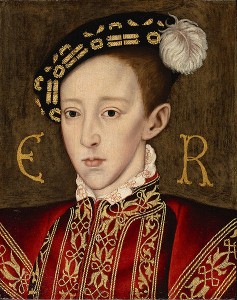 On the evening of 6th July 1553, fifteen-year-old King Edward VI, son of King Henry VIII and Queen Jane Seymour, died at Greenwich Palace in the arms of Sir Henry Sidney, his friend and Chief Gentleman of the King’s Privy Chamber.
On the evening of 6th July 1553, fifteen-year-old King Edward VI, son of King Henry VIII and Queen Jane Seymour, died at Greenwich Palace in the arms of Sir Henry Sidney, his friend and Chief Gentleman of the King’s Privy Chamber.
In his “Devise for the Succession”, Edward had chosen Lady Jane Grey, his cousin Frances Brandon’s daughter, as his heir but her reign was very shortlived as Mary I fought for the crown and was proclaimed queen on 19th July 1553.
Click here to read more about King Edward VI’s death.
The July edition of Tudor Life Magazine is an Edward VI special and you can read a sample and find out about joining the Tudor Society at www.tudorsociety.com/july-tudor-life-magazine-taster/